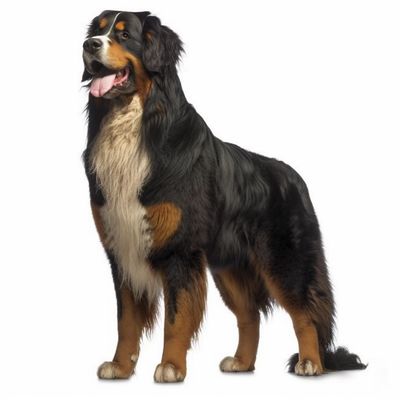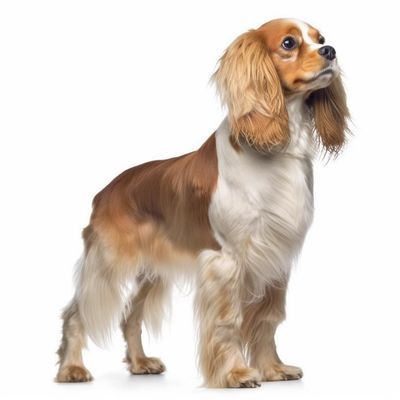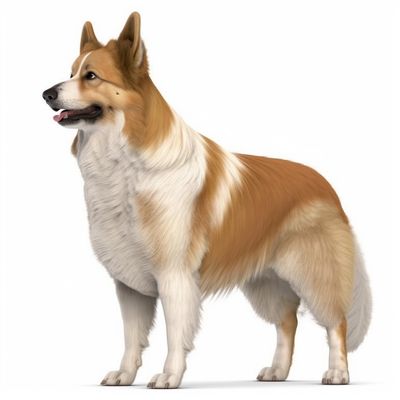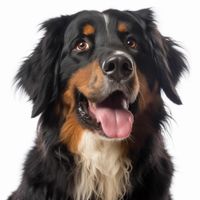Bernese Mountain Dog - vs - Cavalier King Charles Spaniel - vs - Pembroke Welsh Corgi

Bernese Mountain Dogs are large and sturdy, weighing 70-115 lbs and standing 23-28 inches tall.
Bernese Mountain Dogs have a moderate energy level, requiring regular exercise and playtime.
Daily exercise, like walks or playtime, keeps Bernese Mountain Dogs happy and helps prevent boredom.
Bernese Mountain Dogs are intelligent and eager to please, but can be stubborn at times.
Bernese Mountain Dogs are smart and enjoy learning new commands and problem-solving activities.
Bernese Mountain Dogs prefer cooler climates and need space, making them better suited for larger homes.
Gentle and patient, Bernese Mountain Dogs are wonderful playmates and companions for children.
Friendly and sociable, Bernese Mountain Dogs typically get along well with other dogs and pets.
Bernese Mountain Dogs are well-suited for cold weather due to their thick, double-layered coat.
Bernese Mountain Dogs struggle in hot climates and require extra care, like shade, water, and limited exercise.
Bernese Mountain Dogs shed seasonally and require regular brushing to manage their coat.
Regular brushing is necessary to maintain the Bernese Mountain Dog's thick coat and prevent matting.
Bernese Mountain Dogs bark occasionally, usually only when necessary or provoked.
Bernese Mountain Dogs have breed-specific health issues that require additional care and attention, such as regular veterinary checkups, preventative care, and potential medication or treatments.

Cavaliers have a moderate energy level and enjoy a mix of playtime and relaxation.
Cavaliers need daily exercise, such as walks or playtime, to stay happy and healthy.
Cavaliers are eager to please and can be trained easily with positive reinforcement.
Cavaliers are intelligent dogs that enjoy learning new commands and tricks.
Cavaliers adapt well to various living situations, from apartments to country homes.
Cavaliers are gentle, affectionate, and patient, making them excellent companions for children.
Cavaliers get along well with other pets, including dogs and cats, when socialized properly.
Cavaliers can tolerate mild cold but need extra care in extreme cold due to their silky coats.
Cavaliers can handle warm climates, but make sure to provide shade, water, and avoid excessive exercise.
Cavaliers have a silky coat that sheds moderately, so regular brushing can help minimize shedding.
Cavaliers require regular brushing and occasional bathing to keep their coats healthy and tangle-free.
Cavalier King Charles Spaniels bark occasionally, usually only when necessary or provoked.
Cavalier King Charles Spaniels may have some health issues, requiring regular veterinary checkups and preventative care.

Pembroke Welsh Corgis are small dogs with a sturdy build, standing 10-12 inches tall and weighing 24-30 lbs.
Pembroke Welsh Corgis have moderate energy levels and enjoy daily walks, playtime, and interactive toys to stay engaged.
Pembroke Welsh Corgis require regular exercise, such as walks and playtime, to keep them mentally and physically fit.
Pembroke Welsh Corgis are intelligent and eager to please, making them easy to train with consistency and positive reinforcement.
Pembroke Welsh Corgis are highly intelligent dogs, known for their problem-solving skills and quick learning abilities.
Pembroke Welsh Corgis are highly adaptable and can thrive in various living situations, including apartments and homes with yards.
Pembroke Welsh Corgis are generally good with children, but their herding instincts may lead them to nip at heels, so supervision is recommended.
Pembroke Welsh Corgis usually get along well with other dogs and pets, especially if socialized from an early age.
Pembroke Welsh Corgis can handle cold climates, thanks to their double coat, but still require proper shelter and protection during extreme weather.
Pembroke Welsh Corgis can manage in hot climates but require shade, water, and limited exercise during the hottest parts of the day.
Pembroke Welsh Corgis have a double coat that sheds seasonally. Regular grooming can help keep shedding under control.
Pembroke Welsh Corgis require regular grooming, including brushing and bathing, to keep their coats clean and healthy.
Pembroke Welsh Corgis have average bark tendencies and may bark for various reasons, such as alerting their owners or during playtime.
Pembroke Welsh Corgis are generally healthy, but regular veterinary checkups and preventative care are still necessary.



